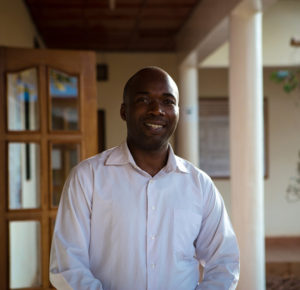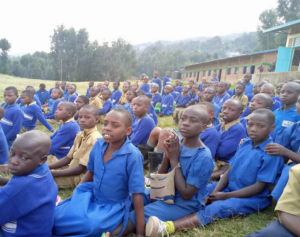Canton man living his dream on the frontlines of global health care
By Jay TurnerAfter 15 years of serving a dream organization and finding his life’s purpose fighting poverty and disease in some of the neediest places across the globe, Dr. Anatole Manzi still finds himself struggling at times to fall asleep at night.
“Whenever I close my eyes I feel like there are so many needs out there and I feel like I’m being distracted from my responsibility to do something [about them],” admitted the husband and father of three.
Previously serving in a variety of clinical and mentorship roles in his native Rwanda for the trailblazing Boston-based nonprofit Partners in Health, Manzi relocated to the Boston area in 2015 after taking on a new position as director of global learning and training for PIH. In addition to leading their organization-wide education and training strategy, Manzi oversaw a team that was tasked with supporting and strengthening health systems in Liberia and other West African nations both during and after the Ebola outbreak.
His newest title, that of director of clinical practice and quality improvement, has taken him to other PIH-supported countries, including most recently Lesotho in southern Africa, where he led a week-long workshop focused on improving maternal health and reducing the maternal and child mortality rates in the small mountain kingdom.
It’s both fulfilling and “fascinating” work, according to Manzi, who also divides his time between various PIH affiliates as an instructor and lecturer.
Still, no matter how much he accomplishes in the global health arena or how many lives he helps to save or dramatically improve, Manzi cannot seem to escape the notion that he could somehow be doing more — perhaps giving more, or building more.
And even as he settles comfortably with his family in his adopted hometown of Canton — a community that he loves and has felt embraced by — he still feels drawn to Rwanda and “anxious” about the significant needs that still exist there.
“Sometimes I do wonder if people think I just got on with my life and left,” he said. “Then I start feeling that probably there’s something going on [in Rwanda] that I could be there for and be more active. But on the other hand, I think I still feel better because the work I’m doing supporting Rwanda and the other countries we’re supporting makes me even more useful.”
***
As someone who often feels torn between two worlds, Manzi still has moments where he struggles with questions of personal identity.
Most of the bios written about him focus on his work history and academic accomplishments, including his two master’s degrees and a doctorate in public health. Yet rarely do they get to the essence of who he is and where he came from.
“I am just someone who came from these areas [supported by Partners in Health],” he said. “Someone who spent a week without meals, who would travel 20 miles to get water, who would spend days and days farming to get food, who worked for others, who saw my mom carrying pounds and pounds [across long distances] for us to have food.”
Born and raised in a rural and isolated section of northern Rwanda, Manzi came of age at a time of tremendous ethnic unrest and violence, culminating with the slaughter of nearly a million citizens over a 100-day period in 1994.
“So as a teenager growing up, my time to see the beauty of people was the same time to see the evil of people,” Manzi said, “and by that I mean the time to witness genocide.”
His father, who was the sole provider for their family of six children, was among those killed. And while they were certainly not unique in that regard, Manzi said their circumstances changed dramatically post-genocide.
“Imagine losing the person who the entire family was relying on,” he said. “Luckily I had my mom, but there were [peers] who probably would stay alone and become the head of their family at that early age, maybe 10 years old, 15 years old.”
Having always been the top student at all levels of his studies, Manzi was fortunate to have received an education and eventually underwent training to become a nurse. Still, in the years following the genocide he bore witness to unfathomable suffering as Rwanda descended into extreme poverty and its healthcare systems collapsed.
“Post genocide we had one of the highest prevalences of HIV and other infectious diseases and people got tuberculosis, people got HIV, and there was no treatment,” Manzi recalled. “The entire country did not have a treatment until really mid 2005 when Partners in Health came to Rwanda.”
For Manzi, the arrival of PIH seemed like a miraculous gift, but one that seemed too good to be true. He had happened upon the organization when one of his colleagues asked if he could drop off a job application, and Manzi, after reading about the PIH mission of providing a preferential health care treatment option for the poor in countries around the globe, could not believe his eyes.
“My reaction was, ‘This cannot exist because this is exactly what I would dream,’ but this is not possible,” he said. “Because I have never seen somewhere where someone would talk about preferential treatment for the poor.”
Although filled with doubt, Manzi knew he had to apply. Yet with only hours before the application deadline and no access to a computer or a copy of his CV, all he could do was hand-write a letter that essentially said, “I need this job.”
“I described who I was,” he said, “but I was almost crying, saying at least [if you] don’t give me a job, then I need to see you or somebody who represents this organization.”
To Manzi’s surprise, he was granted an interview, and despite having no knowledge at the time of HIV and, in his view, not performing well in the interview, he received a job offer two days later. That was in July of 2005, and he has been with the organization ever since.
Starting out as a nurse while also completing a program in mental health, Manzi embraced the clinical work and in his first two years he had over 300 patients on medication with a delivery system, he said, that was “pretty much as good as the one you could find in the best hospital.”
His responsibilities would grow over time, and eventually his focus shifted to mentorship and the development of a mentorship and health systems improvement model that was utilized at various PIH sites and led to “dramatic improvements in maternal and newborn health, infectious diseases, and non-communicable diseases.”
***
As he sits at the table in his Canton home and thinks about his evolution as a global health leader, Manzi still seems amazed by where his journey has brought him.
“Every time I reflect on my path to where I am, I say, ‘Wow, why is this happening to me?’”
But while he deeply misses Rwanda and his many relatives and friends still living there, he knows he has found the right community and has come to think of Canton as “home.”
He still feels that nagging pang of guilt as he enjoys the creature comforts of an American lifestyle, but he has also come to discover, in his short time here, that Canton is a community that cares.
One example of that caring spirit was felt this past spring, when he visited the Student Council at the John F. Kennedy School, where his two oldest children attend, and shared with them his goal of raising funds to assist his own former elementary school back in Rwanda. He talked about the lack of resources at the school — including no water or electricity, and no books or supplies — and within a matter of weeks the students had managed to collect $1,200 to purchase school supplies for their Rwandan counterparts.
“These are people who do not know me,” said Manzi, still awestruck by the students’ selflessness. “But they’re so caring and I think that’s what makes me happy here.”
Manzi is also comforted by the improvements that have been seen in Rwanda — a nation that was once the world’s poorest but has undergone a “remarkable” recovery, according to Partners in Health as well as various media reports.
“There have been dramatic changes,” Manzi confirmed. “Rwanda is, in so many areas, the leading country in Africa in terms of economic growth, in terms of access to education, in terms of gender equity, in terms of development in general.”
At the same time, access to health care remains a real challenge, particularly in some of the more isolated regions of the country. Manzi, of course, has no shortage of ideas to address the problem, and he’s currently in the process of establishing a small nonprofit to get the ball rolling through initiatives at his former school. His goal is to not only continue to equip the school with supplies, but also to “bridge the gap between the health sector and education” by investing resources into basic health training and early detection of infectious diseases.
Manzi plans to call the nonprofit “Move Up Global,” and said he is “very optimistic” that the Canton community will continue to help him.
“If I invest in this, if I am able to reach the families in this region through these students, then I can definitely change the entire population outcome,” he said.
To learn more about Partners in Health and the work that Dr. Manzi is doing in Rwanda and other PIH-supported countries, visit www.pih.org.
Special subscription offer for new in-town subscribers — only $26 for 52 issues! Click here to subscribe today.
Short URL: https://www.thecantoncitizen.com/?p=60224












